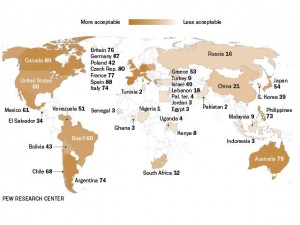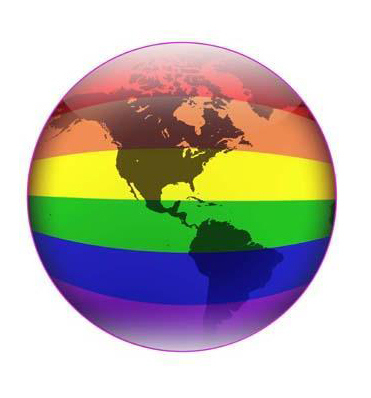
The recent report entitled, “The global divide on Homosexuality” reported that countries which are affluent and secular have greater acceptance for homosexuality. The sample- collected from 39 countries across globe- showed that European Union countries reported the maximum acceptance over homosexuality with Spain (88%), Germany (87%), the Czech Republic (80%), France (77%), Britain (76%), and Italy (74%) sharing this view. Although Poland was the only EU country surveyed where views were mixed; 42% say homosexuality should be accepted by society and 46% believe it should be rejected. Same trend was observed among Latin American and North American countries but it is the Asia/Pacific region, where views of homosexuality were mostly negative. Also, people in Africa and in predominantly Muslim countries remained among the least accepting of homosexuality. In sub-Saharan Africa, at least nine-in-ten in Nigeria (98%), Senegal (96%), Ghana (96%), Uganda (96%) and Kenya (90%) believed homosexuality should not be accepted by society. Even in South Africa where, unlike in many other African countries, homosexual acts are legal and discrimination based on sexual orientation is unconstitutional, 61% say homosexuality should not be accepted by society, while just 32% say it should be accepted.
Overwhelming majorities in the predominantly Muslim countries surveyed also reported homosexuality should be rejected, including 97% in Jordan, 95% in Egypt, 94% in Tunisia, 93% in the Palestinian territories, 93% in Indonesia, 87% in Pakistan, 86% in Malaysia, 80% in Lebanon and 78% in Turkey.
Moreover, the report also showed that there was a strong relationship between a country’s religiosity and opinions about homosexuality. There was far less acceptance of homosexuality in countries where religion is central to people’s lives – measured by whether they consider religion to be very important, whether they believe it is necessary to believe in God in order to be moral, and whether they pray at least once a day.
However, there were some notable exceptions. For example, Russia and China received low scores on the religiosity scale, which would suggest higher levels of tolerance for homosexuality but in reality only 16% of Russians and 21% of Chinese reported that homosexuality should be accepted by society. Conversely, Brazilians and Filipinos were considerably more tolerant of homosexuality than their countries’ relatively high levels of religiosity would suggest.
Also, in most of the countries surveyed, views of homosexuality did not differ significantly between men and women. But in the countries where there was a gender gap, women were considerably more likely than men to say homosexuality should be accepted by society. In Japan, Venezuela and Greece, where about six-in-ten women said homosexuality should be accepted (61% in Japan and 59% in Venezuela and Greece), fewer than half of men shared this view (47%, 44% and 47%, respectively). About half of women in Israel (48%) expressed positive views of homosexuality, compared with just 31% of men. And, while majority of women and men in Britain, Chile, France and the U.S. said homosexuality should be accepted by society, women were more likely than men to offer this view by at least ten percentage points.
Moreover, in many countries, views of homosexuality also varied across age groups, with younger respondents consistently more likely than older ones to say homosexuality should be accepted by society. Age differences were particularly evident in South Korea, Japan, and Brazil, where those younger than 30 were more accepting than those ages 30-49 who, in turn, were more accepting than those ages 50 and older.
For example, in Japan, 83% of those younger than 30 say homosexuality should be accepted, compared with 71% of 30-49 year-olds and just 39% of those 50 and older. Similarly, 71% of South Koreans in the younger age group offered positive views of homosexuality, but just about half of 30-49 year-olds (48%) and 16% of those 50 or older do. In Brazil, about three-quarters of those younger than 30 (74%) say homosexuality should be accepted, compared with 60% of those in the middle category and 46% of those 50 or older.
Results for the survey were based on telephone and face-to-face interviews conducted under the direction of Princeton Survey Research Associates International. Survey results were based on national samples. The study excluded India citing concerns about the survey’s administration in the field.

